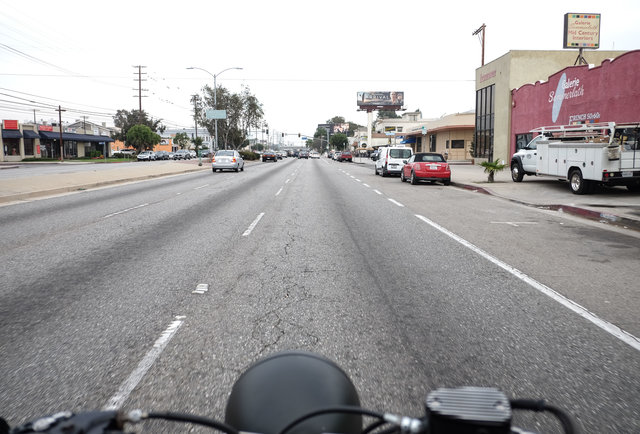
WHY RIDING A MOTORCYCLE WILL MAKE YOU A BETTER DRIVER
By SAM BENDALL Courtesy of Trillist
For many, it's a dream to strap on some gear, hop on a motorcycle, and experience the freedom and rebel spirit of the open road. But it goes without saying that riding a motorcycle is not as easy as driving your Audi. In fact, motorcycles are 38 times more dangerous to operate than cars, and require far more attention and skill.
Which is why when you're learning to ride, you develop both a supreme set of riding skills and an excellent sense of judgment. As a very welcome bonus, honing these skills on a motorcycle makes you a better and safer driver of any type of vehicle. My students (I'm a motorcycle safety instructor in California) regularly tell me how much more aware they are after spending even one day on a bike, because it forces you to be keenly alert and aware of the world and hazards around you. Here's why motorcycle riders are some of the sharpest drivers on the road.
You train yourself to constantly recognize danger and risk
In a car, it's all too easy to feel safe and untouchable in your comfy leather seat, protected from the elements by metal and glass. On a motorcycle, it's vital to accept that what you're doing is dangerous. Complacency on a motorcycle can result in serious injury or even death, and while many high-end motorcycles include technology packages that contribute to a rider's safety, no amount of technology can effectively replace the human element.
Riding safely out in the world means recognizing and avoiding all the things that are trying to kill you. So on top of having to hone the skills and confidence to control the bike itself, riders must fine-tune their situational awareness to recognize the dangers around them. The biggest offenders are the multitudes of oblivious drivers, but it could just as easily be gravel in the middle of the highway, a pothole, a soccer dad making an oncoming left turn in the intersection you are approaching, wet leaves... the list goes on virtually ad nauseam.
Pretty soon you develop and retain that mindset of actively looking out for potential risks -- a skill that's beneficial no matter how many wheels you have, since operating any vehicle is dangerous. Once you've ridden a motorcycle, chances are you'll take your daily commute far more seriously.

You have to deal with hazards before they're a problem
Situational awareness means actively training your eyes, ears, and brain to pay attention to the world around you. As an example, while on the 405 recently, I encountered a piece of a 2x4 on the double yellow line between the fast lane and the carpool lane, but because I was looking far ahead, I saw it well in advance, and safely passed it. My instinctual reaction was that the object was a hazard, and I began to run through how I would handle that obstacle if it were in my path. Could I go around it? Over it? Could I stop in time? A decision like this is made in mere hundredths of a second, so every millisecond you gain from identifying a hazard earlier has a huge impact on your ability to effectively manage the situation.
Ask yourself this: When was the last time you turned your head a full 100 degrees to the right to look over your shoulder before changing lanes in your car? How many times do you check your mirrors in four seconds?
Especially if you're commuting or riding in urban areas densely packed with motorists, pedestrians, and bicyclists, knowing when to prepare yourself to brake immediately or slow down to avoid a potential hazard can save your life. You just have to look around and be actively engaged with everything that surrounds you.
.jpg)
The result? You develop excellent driving skills and habits.
When I'm driving a car, I look over my shoulder when I change lanes. Every. Single. Time. My eyes are constantly scanning the road ahead, my rearview mirror, and my side mirrors every couple of seconds. I can bring my car to an emergency stop from 45mph without relying on the antilock braking system, and can feel when I begin to lose traction. Those habits and instincts get hardwired into your brain with prolonged experience on a bike, which is why motorcyclists are some of the most attentive drivers out there.
And you learn a ton about the physics of driving

When compared to motorcycles, it's fair to say that cars are rather stable. They have four wheels, they cannot simply fall over, there is less chance of injury, and at slow speeds, they're easier to manage. What that means is that suspension and steering dynamics are very, very different on a motorcycle, and you can feel subtle changes far more than when you're driving a car. Because suspension changes are more noticeable, you're forced to fine-tune your steering and throttle usage.
The end result is that you have a much greater sensitivity to what's going on with your vehicle, and a solid appreciation for how your every action impacts it. At the end of the day, you're a safer driver with greater control when the world around you gets dicey.